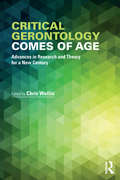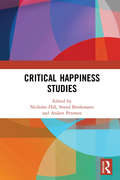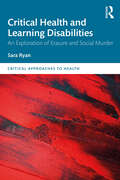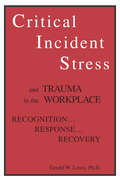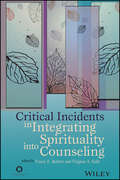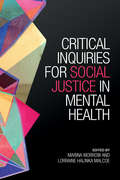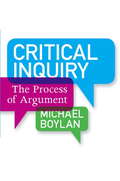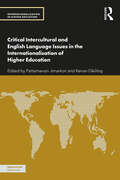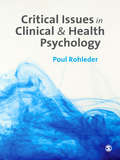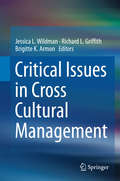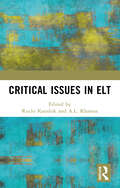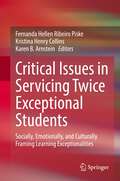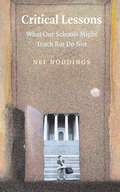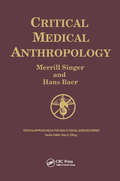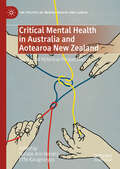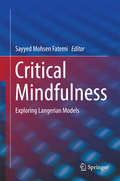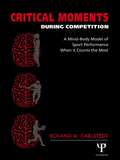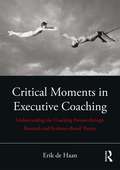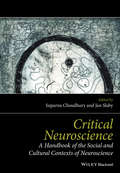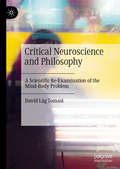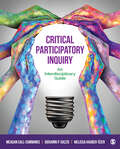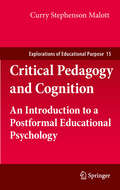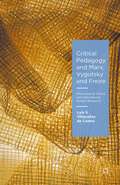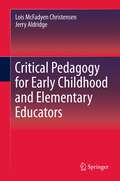- Table View
- List View
Critical Gerontology Comes of Age: Advances in Research and Theory for a New Century
by Chris WellinCritical Gerontology Comes of Age reflects on how baby boomers, caretakers, and health professionals are perceiving and adapting to historical, social, political, and cultural changes that call into question prior assumptions about aging and life progression. Through an exploration of earlier and later-life stages and the dynamic changes in intergenerational relations, chapter authors reexamine the research, methods, and scope of critical gerontology, a multidisciplinary field that speaks to the experiences of life in the 21st century. Topics include Medicare, privatization of home care, incarceration, outreach to LGTBQ elders, migration, and chronic illness. Grounded in innovative research and case studies, this volume reflects multiple perspectives and is accessible to lay readers, advanced undergraduates and graduate students, and professionals in many fields.
Critical Happiness Studies
by Nicholas Hill; Svend Brinkmann; Anders PetersenThis volume draws together the work of a diverse range of thinkers and researchers to address the question of happiness critically, using a wide variety of theoretical and empirical methodologies. Broadening the discussion beyond what might be considered highly individual and insular conceptualizations of happiness, often based on purely positivist approaches to the subject, authors raise questions about the nature of individual and collective anxieties that might underpin the current emphasis on happiness and the ideological or governmental ends that may be served by the framing of happiness in psychology and economics. With attention to how individuals understand and pursue happiness in their daily lives, Critical Happiness Studies highlights different theoretical paradigms that demonstrate the role of power in producing specific conceptualizations of happiness and, consequently, how they frame individual self-understanding or subjectivities and (re)shape political problems. The collection makes available critical, theoretical, and methodological resources for addressing a powerful set of cultural, political, and scientific discourses that have loomed large since the closing decade of the 20th century. A call for the establishment of a body of work in critical happiness studies, this book will appeal to scholars across the social sciences and humanities interested in the age-old problem of happiness.
Critical Health and Learning Disabilities: An Exploration of Erasure and Social Murder (Critical Approaches to Health)
by Sara RyanThis empirically grounded book presents a critical, interdisciplinary perspective on social and cultural issues related to the health and wellbeing of people with learning disabilities. Through an exploration of healthcare, love and intimacy, pregnancy and childbirth, housing, employment and food the book highlights the enduringly impoverished lives and premature deaths people labelled with learning disabilities experience globally and suggests that such structural violence amounts to social murder.Through the lens of critical disability studies, the book links the debates around learning disabilities to the larger framework of deinstitutionalisation. It takes a closer look at the label “learning disability”, which remains associated with stigma and shame, and advances comprehension of how and why it is that the lives of this group of people are systematically constrained and shortened. The book further identifies recommendations that can be utilised for challenging and changing these circumstances.It is essential reading for those involved in social and cultural issues related to the lives of people with learning disabilities, and also beneficial for advanced students in sociology, anthropology, psychology, allied health sciences and other related disciplines. It will also be valuable for researchers and health and social care professionals seeking critical insights about their work.
Critical Incident Stress And Trauma In The Workplace: Recognition... Response... Recovery
by Gerald W. LewisThis text was developed as a manual for those employed in the emergency services ESP, those who deal with victims of trauma in the workplace, work in school systems or acute psychiatric settings, provide assistance to ESP, or who are employed in other settings where persons may experience trauma. The book can also be used by mental health workers as they conduct workshops or provide debriefings where trauma has occured.Visit www.geraldlewis.com for more information.
Critical Incidents in Integrating Spirituality into Counseling
by Tracey E. Robert Virginia A. KellyThis compelling casebook integrates critical incidents, spirituality, and counseling with diverse populations dealing with issues across the life development continuum. It offers counselor educators, students, and clinicians a highly useful educational tool for more effective teaching and practice that will foster lively discussion, case conceptualization, and intervention skills. Using an applied format, the book is organized in seven sections: life span issues, spirituality and wellness, specific disorders, substance abuse, career, diverse populations, and spiritual interventions. More than 50 contributors have been selected either to present specific incidents or to react to them. After each case is described, an expert practitioner answers the questions posed and provides additional insight and alternative strategies. The editors then offer their reflections, providing a concise summary of counseling outcomes. *Requests for digital versions from the ACA can be found on wiley.com. *To request print copies, please visit the ACA website here. *Reproduction requests for material from books published by ACA should be directed to permissions@counseling.org.
Critical Inquiries for Social Justice in Mental Health
by Marina Morrow Lorraine MalcoeAn exceptional showcase of interdisciplinary research, Critical Inquiries for Social Justice in Mental Health presents various critical theories, methodologies, and methods for transforming mental health research and fostering socially-just mental health practices. Marina Morrow and Lorraine Halinka Malcoe have assembled an array of international scholars, activists, and practitioners whose work exposes and disrupts the dominant neoliberal and individualist practices found in contemporary mental research, policy, and practice. The contributors employ a variety of methodologies including intersectional, decolonizing, indigenous, feminist, post-structural, transgender, queer, and critical realist approaches in order to interrogate the manifestation of power relations in mental health systems and its impact on people with mental distress. Additionally, the contributors enable the reader to reimagine systems and supports designed from the bottom up, in which the people most affected have decision-making authority over their formations. Critical Inquiries for Social Justice in Mental Health demonstrates why and how theory matters for knowledge production, policy, and practice in mental health, and it creates new imaginings of decolonized and democratized mental health systems, of abundant community-centred supports, and of a world where human differences are affirmed.
Critical Inquiry
by Michael BoylanA succinct handbook on reading and responding critically to argumentative texts, suitable alike for courses in informal logic and the argumentative/persuasive essay. aa
Critical Intercultural and English Language Issues in the Internationalisation of Higher Education (Internationalization in Higher Education Series)
by Kenan Dikilitaş Pattamawan JimarkonInternationalisation is key to a modern and diverse higher education. Closely related to this is the successful integration of different cultures and languages. This book explores the dynamic relationships between English as a Lingua Franca (ELF), intercultural communication competence (ICC), internationalisation, and the use of the English language in international higher education.Featuring contributions from authors from Türkiye, Slovenia, Thailand, Taiwan and Norway, the chapters discuss topics such as translanguaging, language-related policies in internationalisation, issues of language and interculturality from a contextual point of view of pedagogy, and provide critical reflections on perceptions and orientations in support of higher education internationalisation. Ultimately, the book provides a comprehensive understanding of how the English language functions as a tool for intercultural engagement in academic settings, and the ways in which it is encountered and perceived by researchers, leaders, and practitioners.This book will be valuable reading for applied linguists, teacher educators and researchers, and graduate students in higher education involved in internationalised higher education through teaching, projects and activities.
Critical Issues in Clinical and Health Psychology
by Dr Poul RohlederThis textbook gives a clear and thought-provoking introduction to the critical issues related to health, illness and disability in clinical and health psychology. Challenging some of the preconceptions of ill-health of the biomedical approach, the book explores how health and illness is often shaped by factors such as culture, poverty, gender and sexuality, and examines how these influences impact on the experience and treatment of physical and mental illness as well as disability. Students are introduced to literature from disciplines other than psychology to provide multiple perspectives on these complex issues.<P><P> Critical Issues in Clinical and Health Psychology is a key textbook for undergraduate and postgraduate students taking courses in health or clinical psychology, as well as for students from other disciplines related to health and mental health care.
Critical Issues in Cross Cultural Management
by Jessica L. Wildman Richard L. Griffith Brigitte K. ArmonThis stimulating book surveys the research on the challenges and opportunities encountered when working within culturally and geographically diverse organizational settings. Expert contributors pose and address complex questions regarding cultural competence and leadership in today's rich landscape of global organizations, multiple-leader teams, extensive coordination among locations, and ever-evolving virtual communication technologies. The ideas described here focus not only on building cultural skills to develop and sustain teams, but also on applying knowledge, building insight, evaluating performance, and training team members to be leaders. Among the book's innovations: the Globally Intelligent Leadership framework, strategies for building multicultural collaborative leadership, military and peacemaking perspectives, and new approaches for assessing cross-cultural competencies. Included in the coverage: #65533; Globally Intelligent Leadership: toward an integration of competencies. #65533; Considerations and best practices for developing cultural competency models in applied work domains. #65533; Cultural dilemmas and sociocultural encounters: an approach for understanding, assessing, and analyzing culture. #65533; Conflict competence in a multicultural world. #65533; Twenty countries in twenty years: modeling, assessing, and training generalizable cross-cultural skills. #65533; Expecting the unexpected: cognitive and affective adaptation across cultures. Critical Issues in Cross Cultural Management will interest students, scholars, and practitioners in industrial organizational psychology, organizational behavior, work psychology, and applied psychology programs looking for a summary of up-to-date research and viewpoints on this increasingly salient topic.
Critical Issues in ELT
by Ruchi Kaushik A. L. KhannaELT, a vast and growing field of research, has now moved beyond primary concerns related to developing learners’ proficiency in the language and designing curricula, syllabi, materials and assessment tools. It is witnessing rapid development towards de-centralizing and de-elitizing English, promoting multilingual approaches for teaching English and bridging the gap between language-in-education policies and practices.Critical Issues in ELT compiles research papers by linguists, language teachers, and English language teaching professionals to present contemporary debates on critical issues related to English language teaching, primarily in India. The subject matter of this book includes a variety of articles based on empirical data. It discusses the challenges facing ELT today and also includes papers discussing theoretical positions/frameworks/issues in ELT, classroom-based action research projects, and personal narratives.Print edition not for sale in South Asia (India, Sri Lanka, Nepal, Bangladesh, Pakistan or Bhutan)
Critical Issues in Servicing Twice Exceptional Students: Socially, Emotionally, and Culturally Framing Learning Exceptionalities
by Fernanda Hellen Ribeiro Piske Kristina Henry Collins Karen B. ArnsteinThis book addresses critical issues related to appropriately servicing gifted students with other learning exceptionalities, also known as twice exceptional (2e) students. Utilizing a social, emotional, and cultural lens, it extends beyond the historical cognitive discussion within the domains of special and gifted education and draws on a variety of interpreted perspectives, featuring leading authors, experts, and specialists from several countries and from different academic disciplines and backgrounds. The collection offers a balance between theoretical/methodological and empirical chapters to provide a discourse for operationalization and implementation of services that best serve the educational and individualized needs for a diverse group of students.This work demonstrates the importance of knowing and attending to the social, emotional and cultural dimensions of 2e students while simultaneously fostering the appropriate cognitive skill development for whole-child well-being.
Critical Lessons: What Our Schools Should Teach
by Nel NoddingsCritical Lessons concentrates on the critical, reflective thinking that should be encouraged in high schools. Taking seriously the Socratic advice "know thyself," it focuses on topics that will help students to understand the forces - good and bad - that work to socialize them. This book argues that critical thinking is necessary in both schools and society, and that it requires the discussion of controversial issues: how we learn, the psychology of war, what it means to make a home, advertising and propaganda, choosing an occupation, gender, and religion. Learning how to discuss such issues is vital for life in a liberal democracy.
Critical Medical Anthropology: Life History Of A Physician Of Social Medicine (Critical Approaches in the Health Social Sciences Series)
by Merrill Singer Hans BaerThe purpose of this book is to provide an introduction and overview to the critical perspective as it has evolved in medical anthropology over the last ten years. Standing as an opposition approach to conventional medical anthropology, critical medical anthropology has emphasized the importance of political and economy forces, including the exercise of power, in shaping health, disease, illness experience, and health care.
Critical Mental Health in Australia and Aotearoa New Zealand: Social and Historical Perspectives (The Politics of Mental Health and Illness)
by Effie Karageorgos Natalie Ann HendryThis interdisciplinary volume examines the social production of mental health and illness in Australia and Aotearoa (New Zealand). It draws together cutting-edge critical mental health scholarship from the region, to interrogate how personal, community, institutional and mediated relations, make and remake experiences of ‘mental health.’ In the wake of the widespread insertion of psy-considerations into everyday lives, here contributors demonstrate how the relations between communities, practices, professionals and institutions often replicate long-standing histories of discrimination and violence motivated by psychiatric classification, even as the psy-disciplines move into supposedly more transformational domains: digital technology, schooling, human resources, and social media, for example. The book’s chapters reflect the current diversity within academic studies of mental health and illness in Australia and Aotearoa. This includes a wide range of case studies from war trauma in the Australian military and pornography addiction, to the depathologisation of trans health and peer workers in mental health services. Critical Mental Health in Australia and Aotearoa New Zealand offers unique insights particular to the region, to students and scholars of critical psychology, history, sociology, medical humanities, and education.
Critical Mindfulness: Exploring Langerian Models (SpringerBriefs in Psychology)
by Sayyed Mohsen FatemiExpanding on the trailblazing ideas of Ellen Langer, this provocative volume explores the implications of critical mindfulness for making psychology more responsive and its practice more meaningful. Powerful critiques take the discipline to task for positioning therapists as experts over their clients and focusing on outcomes to the detriment of therapeutic process. Contributors use the principles of Langerian mindfulness to inform self-understanding and relationships, areas such as athletic performance and consumer decision making, and basic and complex forms of cognitive engagement. The mindfulness demonstrated here is not only critical but also creative, inclusive, and humane, with the potential to transform the consciousness of psychology and other mind-based fields. Included in the coverage: · Critical mindfulness of psychology's mindlessness. · The construct of mindfulness amidst and along conceptions of rationality. · Understanding confidence: its roots and role in performance. · Mindfulness in action: the emergence of distinctive thought and behavior. · Langerian mindfulness and optimal sport performance. · Health and the psychology of possibility. Critical Mindfulness is bracing and insightful reading for undergraduate and graduate students, psychologists, psychiatrists, physicians, clinicians, neurologists, and educators within and outside positive psychology. These pages challenge the wider community of professionals to rethink their perspectives on practice--as well as their long-held tenets of living.
Critical Moments During Competition: A Mind-Body Model of Sport Performance When It Counts the Most
by Roland A. CarlstedtThis book presents first-time research findings and new empirically based perspectives and applications in sport psychology.Highly provocative data derived from the largest single study ever on athletes is used to advance an original model of peak performance centering on a clearly emerging athlete's profile. Central to the book is the Theory of Critical Moments, which proposes that mental factors are most crucial during specifically delineated psychologically significant periods of competition and helps explain when and why intrusive cognitions influence performance.
Critical Moments in Executive Coaching: Understanding the Coaching Process through Research and Evidence-Based Theory
by Erik de HaanCritical Moments in Executive Coaching examines the change process supported by workplace and executive coaching, making use of empirical evidence from the study of a range of real coaching conversations and coaching relationships. It is both a complete handbook that for the first time gives access to a global qualitative research base in the field of executive coaching, and a look behind the scenes into the practice of both inexperienced and experienced coaches, their clients and their commissioners. Erik de Haan allows the reader access to the wealth of Ashridge empirical research in this field to date, alongside prominent research groups around the world. This book provides practitioners with a range of suggestions for their contracts, backed up by qualitative and narrative research. It looks at what research is already telling us about the value of coaching conversations and the impact of critical ‘moments of change’ in coaching, from the perspectives of coaches, clients, stakeholders and sponsors. The detailed research findings outlined in the book are supplemented throughout by case studies and snapshots of coaching moments as well as practical advice and insights for those working in the field. The book also brings forward innovative new models and concepts for coaches which have emerged from research. Critical Moments in Executive Coaching offers an evidence and research-based approach that will be of great interest to coaches in practice and in training, students of both undergraduate and graduate coaching programmes and those who supervise and commission coaching.
Critical Neuroscience
by Suparna Choudhury Jan SlabyCritical Neuroscience brings together multi-disciplinary scholars from around the world to explore key social, historical and philosophical studies of neuroscience, and to analyze the socio-cultural implications of recent advances in the field. Original, interdisciplinary approach explores the creative potential for engaging experimental neuroscience with social studies of neuroscienceFurthers the dialogue between neuroscience and the disciplines of the social sciences and humanitiesTranscends traditional scepticism, introducing novel ideas about 'how to be critical' in and about scienceFeatures contributions from eminent scholars including Steven Rose, Joseph Dumit, Laurence Kirmayer, Shaun Gallagher, Fernando Vidal, Allan Young and Joan Chiao
Critical Neuroscience and Philosophy: A Scientific Re-Examination of the Mind-Body Problem
by David Låg TomasiThis book presents an analysis of the correlation between the mind and the body, a complex topic of study and discussion by scientists and philosophers. Drawing largely on neuroscience and philosophy, the author utilizes the scientific method and incorporates lessons learned from a vast array of sources. Based on the most recent cutting-edge scientific discoveries on the Mind-Body problem, Tomasi presents a full examination of multiple fields related to neuroscience. The volume offers a scientist-based and student-friendly journey into medicine, psychology, artificial intelligence, embodied cognition, and social, ecological and anthropological models of perception, to discover our truest self.
Critical Participatory Inquiry: An Interdisciplinary Guide
by Meagan Call-Cummings Giovanni P. Dazzo Melissa Hauber-OzerCritical Participatory Inquiry: An Interdisciplinary Guide brings to life key principles of this collaborative research method for students, practitioners, and research collectives. The authors encourage readers to uncover new possibilities in research guided by the emancipatory roots of CPI to deconstruct inequitable conditions and practices. Weaving together theoretical perspectives, a variety of tools for data collection and analysis, and numerous practical examples, the authors offer a complete picture of the research process from start to finish. This thoughtful and thorough book prepares readers to co-create knowledge effectively and ethically. By addressing the underlying principles common to a variety of action and participatory research methods, readers learn to design and carry out research with, not on, communities. With examples from public health, social work, psychology, education, criminal justice, conflict resolution, and more, the text is suited to a wide variety of graduate-level courses and better reflects the interdisciplinary nature of participatory research with collectives of all sizes and compositions.
Critical Participatory Inquiry: An Interdisciplinary Guide
by Meagan Call-Cummings Giovanni P. Dazzo Melissa Hauber-OzerCritical Participatory Inquiry: An Interdisciplinary Guide brings to life key principles of this collaborative research method for students, practitioners, and research collectives. The authors encourage readers to uncover new possibilities in research guided by the emancipatory roots of CPI to deconstruct inequitable conditions and practices. Weaving together theoretical perspectives, a variety of tools for data collection and analysis, and numerous practical examples, the authors offer a complete picture of the research process from start to finish. This thoughtful and thorough book prepares readers to co-create knowledge effectively and ethically. By addressing the underlying principles common to a variety of action and participatory research methods, readers learn to design and carry out research with, not on, communities. With examples from public health, social work, psychology, education, criminal justice, conflict resolution, and more, the text is suited to a wide variety of graduate-level courses and better reflects the interdisciplinary nature of participatory research with collectives of all sizes and compositions.
Critical Pedagogy and Cognition: An Introduction to a Postformal Educational Psychology (Explorations of Educational Purpose #15)
by Curry Stephenson MalottThis book simultaneously contributes to the fields of critical pedagogy and educational psychology in new and innovative ways by demonstrating how critical pedagogy, postformal psychology, and Enlightenment science, seemingly separate and distinct disciplines, are actually part of the same larger, contextualized, complex whole from the inner most developmentally-fixed biological context of human faculties to the perpetually shifting, socially and politically constructed context of individual schema and human civilization. The text's uniqueness stems from its bold attempt to connect the postformal critical constructivist/pedagogy work of Joe Kincheloe and others to Western science through a shared, although previously misunderstood, critique and rejection of crude forms of social control, which the psychologists call behaviorism and Western scientists identify as mechanical philosophy. This book therefore argues that critical pedagogy-- which includes, among others, anarchist, Marxist, feminist, Indigenous (globally conceived), Afro-Caribbean/American, and postmodern traditions--and critical/constructivist educational psychology have much to gain by engaging previously rejected work in critical solidarity, that is, without compromising one's values or democratic commitments. The goal of this book is therefore to contribute to this vision of developing a more transgressive and transformational educational psychology.
Critical Pedagogy and Marx, Vygotsky and Freire: Phenomenal Forms and Educational Action Research
by Luis S. Villacañas de CastroThis book explores Marx's theory of the phenomenal forms in relation to critical pedagogy and educational action research, arguing that phenomenal forms pose a pedagogical obstacle to any endeavour that seeks to expand an individual's awareness of the larger social whole.
Critical Pedagogy for Early Childhood and Elementary Educators
by Lois Christensen Jerry AldridgeAmong the welter of books on critical pedagogy, this volume will be especially valued for its direct focus on early years and elementary educators. Benefiting from the considered views of two veteran teachers of critical pedagogy, the volume is far more than a knowledge-rich resource, offering as it does vital support in applying the tenets of critical pedagogy to classroom practice. Alongside specific examples of teachers engaging in critical pedagogy in elementary and early-childhood classrooms, the material features close analysis and guidance that will help ease teachers into reflective practice in critical pedagogy that is based on praxis--the point at which theory and practice meet and interact. Indeed, the authors move readers even further than this, showing how students as well as teachers can transform their experience of education through critical reflection. After surveying the field of critical pedagogy, the authors discuss the core precepts that inform the classroom practice of critical pedagogues. They move on to discuss how vital these early and elementary years are in forging children's nascent identities. Other topics covered include discrimination, gender issues, the development of social justice projects, and the social transformations that critical pedagogy can manifest in the classroom. Finally, this resource explains how teachers can move forward in their classroom practice to enhance equity, justice and social responsibility. This book is essential reading for classroom practitioners in early and elementary education, whether neophytes or veterans, who are interested in deploying this powerful educational paradigm in their work. After surveying the field of critical pedagogy, the authors discuss the core precepts that inform the classroom practice of critical pedagogues. They move on to discuss how vital these early and elementary years are in forging children's nascent identities. Other topics covered include discrimination, gender issues, the development of social justice projects, and the social transformations that critical pedagogy can manifest in the classroom. Finally, this resource explains how teachers can move forward in their classroom practice to enhance equity, justice and social responsibility. This book is essential reading for classroom practitioners in early and elementary education, whether neophytes or veterans, who are interested in deploying this powerful educational paradigm in their work.
